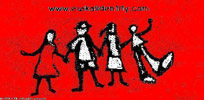euskaldiaspora? What does it mean?
euskaldiaspora or euskal diaspora refers to the Basque Country or Euskal Herria, and its diaspora. euskaldiaspora is a hypertextual experiment on the Basque diaspora online that allows to explore the geographical webscape of the Basque diaspora as well as to visualize it and to reimagine the Basques online.
 The Basque Country consists of 7 provinces or historical territories (herrialdeak): Araba, Bizkaia, Gipuzkoa, and Nafarroa lie within the borders of the Spanish State, forming the Southern or Peninsular Basque Country (Hegoalde). Lapurdi, Behe Nafarroa and Zuberoa, found in the France State, form the Northern or Continental Basque Country (Iparralde). The Basque Country covers a surface area of 8,218 square miles at the western end of the Pyrenees, making it slightly smaller than the US State of New Jersey. It has a total population of nearly three million people. Over 91% of the total population lives in the Southern Basque Country this account for about 86% of the Basque Countrys total area.
The Basque Country consists of 7 provinces or historical territories (herrialdeak): Araba, Bizkaia, Gipuzkoa, and Nafarroa lie within the borders of the Spanish State, forming the Southern or Peninsular Basque Country (Hegoalde). Lapurdi, Behe Nafarroa and Zuberoa, found in the France State, form the Northern or Continental Basque Country (Iparralde). The Basque Country covers a surface area of 8,218 square miles at the western end of the Pyrenees, making it slightly smaller than the US State of New Jersey. It has a total population of nearly three million people. Over 91% of the total population lives in the Southern Basque Country this account for about 86% of the Basque Countrys total area.
Although the Basque Country as a whole consists of seven provinces, they do not all share the same political structure. The Iparralde provinces along with Barn constitute the Department of the Pyrenees Atlantiques (i.e., the former Low Pyrenees, within the Region of Aquitaine). It is an administrative territorial body without any kind of socio-economic or political autonomy. Since the fall of General Francisco Franco's dictatorship (1936-1975), the four provinces of Hegoalde have been divided into two different political structures with their own governments and parliaments. Araba, Bizkaia, and Gipuzkoa form the Basque Autonomous Community or Euskadi. The Basque Statute of Gernika (1979) provides a strong self-government, with important legal, fiscal, and financial degrees of autonomy. The Foral Community of Nafarroa has a moderate level of self-government.
Euskara, the Basque language is one of the most distinguished identity markers of the Basque people. Euskara is the sole survivor of the so-called Pre-Indo-European languages of Western Europe (6,000 BC). However, its origins are still unknown. Most of those languages were extinguished during the Iron Age (1,500-1,000 BC). Today, over 25% of the Basque homeland population speaks Basque, while over 15,000 people from all over the planet study the Basque language every year.
 The Basque diaspora is constituted by immigrant and exile communities scattered all over the planet, where they form a distinctive collective identity to their host societies dominant culture. They create specific social identities, institutions, and networks across spaces and over time. The Basque diaspora institutions and networks favor transnational or cross-border interactions and ties with the Basque Country and with co-diasporic members (i.e., a world spanning web of attachments and diasporic allegiances) as well as the formation, maintenance, and development of their identities. I consider the Basque diaspora as a plural cultural reality, not as a monolithic and homogeneous community. It integrates and accommodates migrants from diverse times, generations (consecutive or not) and regional places who bring their own sense of Basqueness and thereby help to reshape existing meanings of identity within their new host Basque diasporic communities.
The Basque diaspora is constituted by immigrant and exile communities scattered all over the planet, where they form a distinctive collective identity to their host societies dominant culture. They create specific social identities, institutions, and networks across spaces and over time. The Basque diaspora institutions and networks favor transnational or cross-border interactions and ties with the Basque Country and with co-diasporic members (i.e., a world spanning web of attachments and diasporic allegiances) as well as the formation, maintenance, and development of their identities. I consider the Basque diaspora as a plural cultural reality, not as a monolithic and homogeneous community. It integrates and accommodates migrants from diverse times, generations (consecutive or not) and regional places who bring their own sense of Basqueness and thereby help to reshape existing meanings of identity within their new host Basque diasporic communities.
Basques and their descendants live across the world. Some of them are organized in over 210 Basque associations or Euskal Elkarteak, in over twenty countries, creating thousands of socio-cultural activities every year to keep the culture alive. Although the latest waves of Basque migrants into the New World are quite recently, the Basque presence in the New World date back to the discovery of the American continent in the 1500s. The first Basque modern migrant organization was established in Matanzas, Cuba, in 1868, Montevideo, Uruguay, in 1876, followed by one in Buenos Aires, Argentina (1877), and another in Manila, the Philippines (1880s).
Webscape?
 The Basque diaspora webscape is the digital landscape of the Basque diaspora. As of March 2009, there were over 130 Basque diaspora institutional web sites online. The Basque diaspora webscape is constituted by web sites (texts and graphics), which create a common networked set of online discourses across geographical, political and linguistic barriers, and which are produced by multiple authors. The hypertextual nature of the web text allows analyzing the discourses constructed by the Basque diaspora institutions online.
The Basque diaspora webscape is the digital landscape of the Basque diaspora. As of March 2009, there were over 130 Basque diaspora institutional web sites online. The Basque diaspora webscape is constituted by web sites (texts and graphics), which create a common networked set of online discourses across geographical, political and linguistic barriers, and which are produced by multiple authors. The hypertextual nature of the web text allows analyzing the discourses constructed by the Basque diaspora institutions online.
The 2007-2009 period is characterized by the increasing establishment of social network sites (first blogsmainly hosted in Fotolog and Bloggerand then MySpace and Facebook) to the detriment of websites. As of June 2013, 143 Basque diaspora groups from nineteen countries had created a profile on Facebook alone.
What about hypertextuality?
According to Antonio Rodriguez de las Heras hypertextuality or intertextuality is a folded text, a new geometry of the text in cyberspace. Imagine an ordinary piece of paper that we fill out with words...then, we are asked to read it through a small window (i.e., the computer electronic screen). The written area of the paper is larger than the screen...the technology offers you an unlimited depth, but you look through a small screen. One of the ways to solve this discrepancy is: To cut the page down to the size of the screen. Then, the technology offers us links to tight together the pieces of the cut page to fit the screen.
The hyperlinks offered here tight together the set of discourses produced by the different Basque diaspora web sites. The online text provides the opportunity to interconnect the diverse Basque texts-sites with specific "hyperlinks" or "links" allowing the reader to move from one text to another. The links imply, first of all, a horizontal network of connections.
Where could I get more information?
Here you have some information and resources online:
 Euskalidentity is the web site for Euskalidentity Kultur Elkartea (EIKE), a non-profit cultural association dedicated to study Basque identity worldwide. It was created by a group of people coming from different walks of life with two clear goals in mind: promotion and dissemination of Basque culture throughout the planet. Its sister site is euskaldiaspora.
Euskalidentity is the web site for Euskalidentity Kultur Elkartea (EIKE), a non-profit cultural association dedicated to study Basque identity worldwide. It was created by a group of people coming from different walks of life with two clear goals in mind: promotion and dissemination of Basque culture throughout the planet. Its sister site is euskaldiaspora.
 The Center for Basque Studies , at UNR, is the leading international research and teaching institution on Basque studies outside the Basque Country. Please also visit:
The Center for Basque Studies , at UNR, is the leading international research and teaching institution on Basque studies outside the Basque Country. Please also visit:  T
T he Basque Studies Library, at UNR.
he Basque Studies Library, at UNR.


